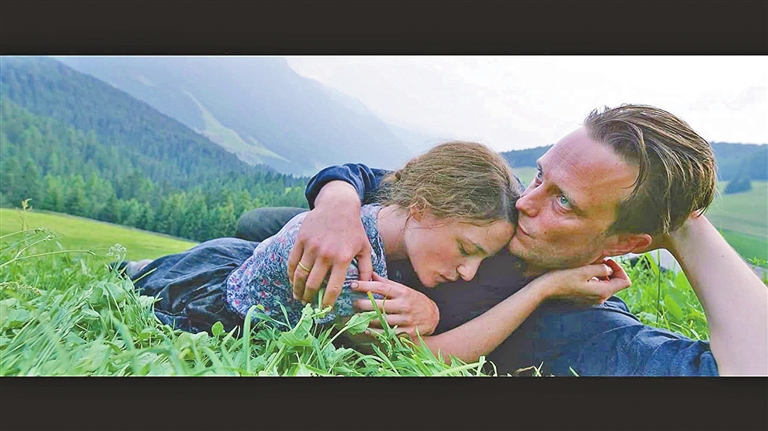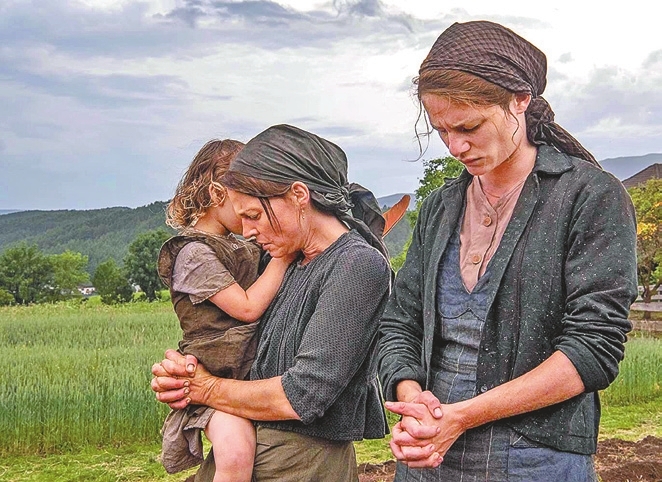

Starring: August Diehl, Valerie Pachner, Maria Simon, Karin Neuhauser, Bruno Ganz Director: Terrence Malick Terrence Malick’s heartfelt and reverently high-minded new movie is inspired by a life that is little-known — hidden, perhaps. Franz Jagerstatter was an Austrian conscientious objector during the Second World War who made a personal stand for his anti-Nazi beliefs by refusing to take the Hitler oath as a Wehrmacht conscript and in 1943 was duly executed. August Diehl (who played the lead in Raoul Peck’s “The Young Karl Marx”) is Jagerstatter; Valerie Pachner is his wife Franziska, and there are cameos from Matthias Schoenarts as Jagerstatter’s defense lawyer and the late Bruno Ganz as the military tribunal president who sorrowingly questions Jagerstatter about what he sees as the stubbornness and futility of his beliefs before reluctantly passing the terrible sentence of death. The title is taken from George Eliot’s “Middlemarch”: “The growing good of the world is partly dependent on unhistoric acts; and that things are not so ill with you and me as they might have been, is half owing to the number who lived faithfully a hidden life, and rest in unvisited tombs.” Modest though he was, Jagerstatter’s own tomb is not in fact entirely unvisited, as Pope Benedict XVI beatified him in 2007, perhaps partly in contrition for the Church’s failure to oppose the Nazis. The style that Malick has found for this subject is very much the same as ever: an overpowering sense of being ecstatically, epiphanically in the present moment, an ambient feeling of exaltation created by a montage of camera shots swooning, swooping and looming around the characters who appear often to be lost in thought, to an orchestral or organ accompaniment, and a murmured voiceover narration of the characters’ intimate but distinctly abstract feelings and memories. One tic is not here, in fact: the camera shot directly into a distant sunset. Perhaps it felt too American. When Malick uses black-and-white newsreel clips, it is momentarily disconcerting to be reminded of straightforwardly conventional cinematic grammar. Deploying this rhetoric in the service of such an important subject would appear to make sense. Often it does make perfect sense, although Malick has made a movie about the Second World War before: “The Thin Red Line” in 1998, his adaptation of James Jones’s novel about the battle of Guadalcanal in the Pacific. Malick’s visionary approach points up at first the pure happiness of the couple’s life together in the village of Radegund, and then it distils the agony of Jagerstatter’s qualms of conscience and his dark night of the soul as he decides to defy the Nazis, and then his loneliness and anguish in prison — and Franziska’s own loneliness left alone with the children, an outcast. Its religious quality is appropriate too, as Jagerstatter was a Catholic. Yet the strange thing is that the nature of the leading character’s intensity seems not all that different from the intensity of Ryan Gosling’s thoughtful singer-songwriter in Malick’s “Song to Song” (2017), or Christian Bale’s tortured screenwriter in “Knight of Cups” (2015) or Ben Affleck’s engineer in “To the Wonder” (2014) whose woes are considerably less pressing — though their spiritual lives are undoubtedly important, and Malick is an film-maker very much concerned with the life of the spirit. It is as if Malick has taken Jagerstatter and enclosed him in exactly that same hermetically sealed environment of heightened awareness of the present moment, and unawareness of the larger context. By creating one of his signature rhapsodies around this anti-Nazi figure, Malick has in a way marooned and islanded Jagerstatter, detaching him from much of the larger historical context — though one thing the film does reveal is that Jagerstatter was not as prominent a figure as, say, Sophie Scholl, because he did not actively campaign for and publicize his views: What he did was report for a second term of duty in the Wehrmacht (having already served uncontroversially up to the fall of France), refuse to give the oath, and then submit to being bundled away. Yet Malick does succeed, to some degree, on his own terms; he attempts to give some stylized sense of this man’s inner life: his emotional and spiritual architecture. It is admirably serious but static.(SD-Agencies) | 
